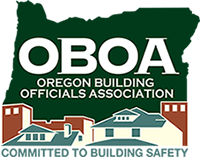- Home
- About Us
- Membership
- Job Postings
- Committees
- Events
- Special Inspection Program (SIP)
|
Are you looking for a great career? Be an Inspector!We are FIRST PREVENTERS: Whether our title is Building Official, Inspector, Plan Reviewer, or Fire Marshal — our mission is the same: to prevent harm by ensuring compliance with building safety codes before a disaster occurs. Prevention goes unnoticed by design and definition — success is a non-event. Why should I be a Building Inspector?If you have an analytical mind and a bit of mechanical aptitude, you will make a great Building Inspector! If you enjoy being outside, work that is challenging and constantly changing, and love seeing how things work, this job is for you! The inspection workforce is in crisis. An estimated annual statewide workforce shortage of 115 residential inspectors and plans examiners is a major barrier to statewide housing production and, if not addressed, will continue to cause delays in reviewing and approving housing projects. We need you. Who are all the players? What do we do?An Inspector will familiarize themselves with the plans for a project and then travel to job sites to verify that the project is being built to the approved plans. Inspectors speak face to face with builders to explain any corrections that may be needed. If corrections are required, the builder will do the work then and recall the inspector to verify completed corrections. Inspectors also attend pre-construction meetings and close out a project when all work is done by doing all final inspections to make sure that the project is complete and meets all Code requirements. Inspectors are mostly self-supervised while in the field, and must have good time management skills. A Permit Tech is the initial face of any building department. They receive and verify all submittal docs are correct and then distribute them to the necessary players. Once the plans are approved, they will issue the permits, collect fees, etc. The Permit Tech position generally doesn’t require any special certifications to get into, although there are higher level certifications to become a Permit Coordinator if you choose to go that route. A Plans Examiner receives plans from the Permit Techs and reviews them to verify that they meet the minimum Code standards. If errors are found, the Plans Examiner will write a document with technical corrections that need to be made to the plans before they can be approved and send it to the applicant. Once corrected plans are received and are verified as code-compliant, the Plans Examiner will stamp them and send them back to the Permitting Team. The Plans Examiner works with several departments and must have a fairly commanding knowledge of all relevant Codes and Standards. A Building Official (BO) is the head of the building department. This position can vary quite a bit depending on the size of the city/county/jurisdiction. In a small town, the BO could be a “one person show” - doing all permitting, plan review and inspection, as well as budgeting, etc. In a larger jurisdiction, the BO may be a more administrative position – managing staffing, HR interactions, hiring and firing, etc. What is the job like on a day-to-day basis? Most days will start with you going over your workload for the day and working with customers and contractors to build your route and the order of your inspections. An Inspector is going to spend most of their day in the field, driving from job to job, talking with people and going over the work that is ready for inspection. What are the job benefits? Any of the above positions at an Oregon jurisdiction (city/county) can expect a:
If you are looking for a rewarding and interesting career with stable, healthy paychecks and a great work/life balance – but with enough variety to keep you from getting bored, you have found the job for you! Did you know? $$In Oregon, the wages for a building inspector or plans examiner range from $27.74 to $53.54 per hour – or $57,700 to $111,363 annually. The average hourly rate is $40.59, with an average annual salary of $84,441 — depending on experience and certification levels. Typically, employers also cover the costs of additional certifications and trainings, which is a huge financial benefit. Generally, benefits will add another 50% to the salary for total compensation. In general, Permit Technicians make slightly less, and Building Officials or department managers make more. What is the path? Where do I start? How do I end up with a job? There are several ways to enter the industry. There are two schools in Oregon that offer a two-year degree program in Building Inspection: Portland Community College (PCC) and Chemeketa Community College. Portland Community College (PCC) — PCC is currently 100% online, and most classes are night classes so you can study and still keep a day job if you need. PCC offers a Building Inspection Technology (BIT) program delivered by experts in the field. PCC’s Building Inspection Technology program teaches a diverse set of skills, enabling you to begin a career working in governmental jurisdictions or private industry. Students develop and apply a basic understanding of concepts, theories, and principles of construction and codes. The certificate in Residential Plans Examination prepares students for work reviewing plans for 1- and 2-family residential projects. The AAS degree in Building Inspection Technology prepares students for both residential and commercial plan review and site inspections. Please check out more details at PCC's website: Building Inspection Technology at PCC. Chemeketa Community College — Chemeketa’s award-winning Building Inspection Technology program provides robust and relevant training for those looking to transition into Building Inspection, Plans Examination, or Permit Technician positions for government or private sector employers. The building inspection industry is experiencing massive vacancies that need to be filled immediately. These positions are in very high demand and provide living wages with excellent benefits. While the 2-year AAS degree in Building Inspection Technology is considered by industry to be the gold standard, due to industry shortages, the program was revamped in 2024 to offer three additional short term non-credit certificates that complement the AAS degree. The benefit is a quicker path to potential employment after just one or two terms of study, while keeping in line with the AAS degree path. Learn from anywhere — all but three classes are delivered live, in the evenings with an instructor, in remote format. This means students, equipped with a computer and internet connection, can take classes from any location. For those challenged by distance, flexible accommodations are available. Registrations for the Fall 2025 cohort began February 18, 2025. For additional information and registration visit http://go.chemeketa.edu/buildinginspection, www.ccicc.org, or call 503.399.5163. Important – Please note: Attending one of these two schools is not the only way to become part of a building department at a city or county – everyone has a different path into this career, and it can vary a lot. Let's talk! An OBOA member would be more than happy to connect with you — they can help explain how they got to where they are and possible tips on finding the best path for your situation and experience. It's always helpful to talk through details and every situation is different so please reach out to OBOA to receive great info, contacts, and resources for your next steps. Building Codes Division (BCD) administers Oregon’s Statewide Building Code, which provides uniform standards that ensure newly constructed residential and commercial buildings are safe for citizens to occupy. In addition, BCD also provides code development, inspection, plan review, inspector licensing and permit services to the construction industry. BCD offers inspection and plan review classes for current Permit Techs, Inspectors and Plan Reviewers looking to expand their skillset. Beginning in 2026, BCD will open a select number of seats to the general public for residential courses. Please visit the Inspector Training webpage on the BCD website for more details: https://www.oregon.gov/bcd/inspector-training/Pages/registration.aspx International Code Council (ICC) is the overall governing body for Code administration. It is possible to work with ICC to study the various commercial, residential and fire related codes and standards and test through their agency testing facilities. This option may be best for someone that has worked in construction for some time and feels they know the industry pretty well. When you pass any of the ICC exams, you will receive a certification of competency showing you are proficient in that particular field. Go to learn.iccsafe.org/ui/home for more information on this path or visit ICC's main website for all things building code. The last step would then be to convert your certification(s) to Oregon Certifications through the State of Oregon Building Codes Division, which is generally done once you have been hired by a jurisdiction.
Code Professionals Flyer | Learn More about OBOA as a Professional Association
|



